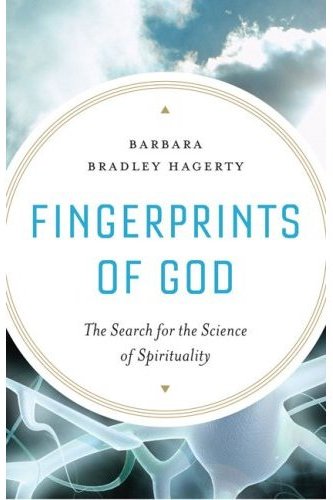
Fingerprints of God: The Search for the Science of Spirituality
by Barbara Bradley Hagerty
Barbara Bradley Hagerty thought she lost her Christian Science faith after she took her first Tylenol. Years later, deep in a (literal) forest, she found herself searching again for “an all-seeing God whose GPS would guide me off the mountain.”
It’s rare to see religion and religious experience discussed with so light a touch. In the years after she left the faith within which she was raised and searched for God-as-GPS, Hagerty pursued a decidedly more ambitious search for God as chemist, electrician, and “master craftsman.” The result is a history of the science of religion that is also a study of individual mystical experience, benefiting from Hagerty’s efforts to balance a journalist’s skepticism with a believer’s faith.
Hagerty argues that despite the 20th-century triumph of Behaviorism, which suggested that things that can’t be observed can’t be real (or at least can’t be part of science) some researchers have begun to explore the biology and psychology of spiritual experiences. It is primarily their historical efforts and current work that Hagerty discusses, sometimes undergoing experiments herself with unexpected results. She presents studies finding how epileptics’ altered brain chemistry can connect them to spirituality (and perhaps has for centuries). She finds scientists who seek the “God Gene”, pondering the implied “deistic favoritism” of those who possess it. And she meets others who search more probably for a “God Spot” in the brain, where spiritual experiences are, depending on your perspective, received or created.
Her interviews are particularly engaging, presented as conversations with people who say they’ve experienced God in one way or another (as long as they pass her test – that she wouldn’t mind having them at a dinner party and that they’ve questioned their sanity). She allows each subject significant space, filling pages with their recollections in their words, with little interruption. One is a Buddhist who found God through meditation, another is a former alcoholic. She meets and witnesses the remarkable conditioning of people she terms “spiritual virtuosos,” like monks and meditative champs (however much an oxymoron that seems). Several of her subjects survived severe injury and near-death, including one whose near-death visions where the first images she had ever seen, having been born blind. She sits, but doesn’t fully partake, in a peyote circle. Most interestingly, all her subjects have similar experiences, or rather, metaphors for their experiences – they speak of light and breath and oneness, no matter their route to spirituality.
Some brains, Hagerty suggests, seem primed for faith and peak experience, and faith in turn seems capable of altering the brain. But ultimately she argues only for scientists and psychologists to inquire openly about mystical experiences. And Fingerprints of God is written in this spirit, aiming to be objective and open-minded.
When she isn’t as objective as she’d like to be, Hagerty acknowledges it. She presents the arguments of devout atheists – and gently bats them down – and instances in which studies didn’t work as planned. (Particularly interesting on that count was an attempt to prove the validity of near-death experiences by placing pictures high on the walls of hospitals, hoping that they would be “seen” by patients floating above their bodies.) On peyote-fueled spiritual experience, which she seems uniquely unwilling to grant legitimacy, she gamely notes, “It peeves me to think that some people can ignite their faith life with a pill, probably because I lack the courage to do so. It irks me to contemplate all those hours of study and prayer, down on my knees straining to connect with God, when I could have swallowed a mushroom.” But a lack of bias would make her book less interesting. Indeed, Hagerty is part of her subject in an essential way; she is a spiritual seeker personally and professionally. It shapes her inquiry, and yet, she is still honest and light-handed with this heaviest of subjects.
Excerpt: In the scores of interviews for this book, I noticed a predictable chasm between people who had experienced transcendence and those who had not. Both would burn at the stake for their positions.
On the one side marches the well-armed, highly trained, battle-tested brigade of scientists who insist that everything is caused by material processes. These scientists – and they are the vast majority of the academic community – believe that thoughts, feelings, desires, and intentions arise from the interaction of brain chemicals and electricity. They arrive at this conclusion through observation, using material instruments to measure a material brain….
On the other side of the debate is a small, underfed, and under-armed guerrilla force lobbing single grenades from the bushes. These scientists…claim that molecules do not explain love, or willpower, or the occasional glimpse into spiritual dimensions. Significantly, I noticed that scientists who had themselves waded into spiritual waters – through prayer, meditation, or a near-death experience – always fall into the spiritual camp. Their personal experience trumps the assumptions of modern science.
Further Reading: The Varieties of Religious Experience, a Study of Human Nature and The Language of God: A Scientist Presents Evidence for Belief




Send A Letter To the Editors